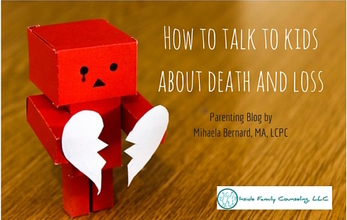
I am sure we can all relate to losing a loved one, a pet or a favorite toy, and it can be just as hard for the adults if not harder, to cope with the loss as it is for the kids. For this reason, I am going to talk about how do we discuss death and loss with our children and what can we do to overcome it.
The first and most important thing we need to do when talking to our children about any difficult topic but especially about death and loss is to
- Name the loss. This is usually the most important, yet sometimes most difficult part for parents and caregivers. We tell ourselves that kids are too young to understand. Or we want to protect them and we tend to spare them the truth. However, it’s essential that we put into words our children’s experiences because words bind the anxiety associated with the unknown and eventually, provide a sense of relief.
- Tell the truth in a developmentally appropriate way. I often hear people struggle to tell the truth to their kids for one reason or another, again trying to protect them or spare them the details. Sure, you don’t need to give unnecessary and confusing information but you can use words that are appropriate for their age that will help them make meaning later. For example, “So and so was very ill, the doctors could not help him/her and s/he died.”
- Recognize the feelings associated with the loss. “It’s very sad when we lose someone we love. It hurts a lot but it will get better.”
By reading to your children about what seems hard to talk about, you are recognizing the problem and validating their feelings.
- Create rituals and activities around saying goodbye and remembering such as attending the funeral, writing a letter, creating a small memorial site, etc. Rituals are a way to commemorate the life of our loved ones, to create a space in our minds to remember all the good times we’ve had together and to allow us to move on with a new appreciation for each other and those around us.
- Teach your children about death and most importantly, teach them to value life and to be brave to pursue their dreams. Tell them that you love them so that they can do the same for those they love. Because at the end of the day, we all die but it is HOW we live that matters most.
Is your family going through a loss? Call for a free, 15-minute consultation to see if psychotherapy can help you and your child cope.
You may also like:
10 must-do’s with the kids when you decide on divorce: A client of mine told me about #6.
Daddy left: How to talk to your kids about your separation
Depression during adolescence infographic: 8 Insights every parent needs to know



 RSS Feed
RSS Feed